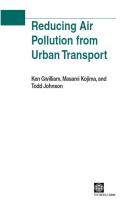Publications

Urban transport is essential to social and economic development. It also improves individual welfare by meeting people’s aspirations for greater mobility. Increased motorized vehicle ownership and use is widely viewed as both a source of income growth and one of the benefits growth confers. But motorized transport also carries social and economic costs, not least through its adverse impacts on urban air quality. Poor air quality has been shown to seriously affect public health, resulting in 3 million premature deaths from fine particulate air pollution alone around the world in 2012 according to the World Health Organization.
The need to tackle air pollution from transport—including private vehicles, trucks, and buses that run on gasoline, diesel, and other fuels—is widely acknowledged. But the menu of options available is varied and can be daunting. Are there key questions that should be answered to guide policymaking? Are there key steps that are essential or underlying conditions that must be met, without which pollution reduction is unlikely? Which mitigation measures are robust, which may be implemented successfully, and which are still in the arena of pilot-testing? Under what conditions are specific mitigation measures likely to achieve pollution reduction?
Reducing Air Pollution from Urban Transport is intended to provide guidelines and principles for answering these and other related questions. The report does not attempt to provide a detailed road map applicable to all circumstances. Given the varying nature of air pollution, pollution sources, urban transport systems, and available resources, answers and even key policy questions will be different from country to country and city to city. Rather, this book proposes a framework for selecting and implementing policies, drawing lessons from international experience. It places a special emphasis on how to coordinate policies across three sectors that affect and are affected by the mitigation of air pollution from road transport—environment, transport, and energy—and how to reconcile the sometimes conflicting objectives and demands of these sectors to improve air quality.
Gwilliam, Ken; Kojima, Masami; and Johnson, Todd. 2004. Reducing Air Pollution from Urban Transport. Washington, DC: World Bank.